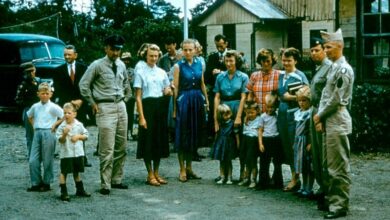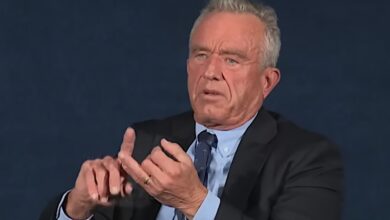A lifeline for those that have chronic pain
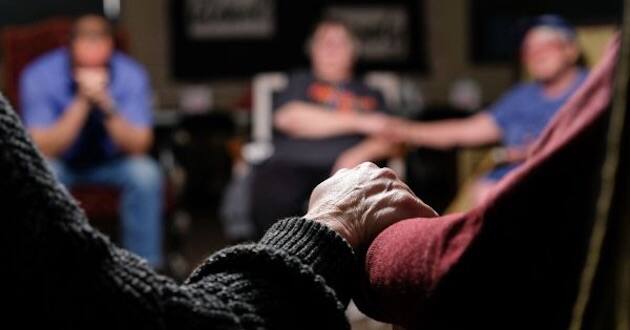
Chronic pain is more prevalent than many people realize. This ministry helps churches across the country offer support.
Their elbows, knees and ankles throb.
Fatigue wrecks their ability to move at times.
Like around one-fifth of U.S. adults, these Christians — young and old, male and female — live with chronic pain.
The Broken & Mended support group meets at the Woodward Church of Christ in Oklahoma / Photo by Audrey Jackson
Often, debilitating prognoses make those who suffer feel all alone, as if no one understands.
But at a monthly meeting in this Oklahoma town, the afflicted find support — some in person, others via Zoom — through a ministry called Broken & Mended.
Friends, family members and caregivers are invited to join the gathering, hosted by the Woodward Church of Christ, about 140 miles northwest of Oklahoma City.
As the group convenes, about 15 adults choose seats in a circle of chairs in the fellowship hall.
Some of the chairs are soft. Some are hard. Some are easier to stand up from than others. Those things matter to people with chronic pain.
So does the strict time frame: The meetings last an hour or less, filled with health updates, Bible reading and prayer requests.
“My sister is on new meds,” Rhea Walker, a member of the Woodward church, tells the group. “Her body needs some healing.”
“Lord, hear our prayers,” the group responds in unison before turning to the next person.
Access to MinistryWatch content is free. However, we hope you will support our work with your prayers and financial gifts. To make a donation, click here.
Pain and acceptance
In the circle, there’s Jennifer Austin, a 35-year-old kindergarten teacher.
Austin has degenerative disc disease, but she’s delaying back surgery until her 1-year-old son, Jeremiah, is a bit older.
“He won’t understand why I won’t be able to hold him or pick him up,” Austin explains. “And so, even though there’s a lot of pain to me right now, surgery’s just not worth it.”
During a prayer, Austin holds hands with Ronna Valentine, a 60-year-old school secretary who describes herself as a “control freak.”
Being diagnosed with rheumatoid arthritis in her 50s certainly wasn’t something Valentine — Walker’s sister — planned.
“I fight with accepting this, and I feel like turning it over to God is really the key to accepting it,” Valentine shares with the group. “And that is why I really appreciate this ministry.”
Michael Brien, a 58-year-old pastor who served six years in the U.S. Army, sits a few chairs to Valentine’s left.
Brien has an inflammatory condition called ankylosing spondylitis and other autoimmune diseases. Because of heart issues, he relies on portable oxygen to help him breathe.
“It’s really hard to get up and preach about the goodness of God and the healing power of God and all these things,” he tells the circle, “and you’re up there sucking on oxygen yourself and walking on a cane.”
Far reach of pain
Chronic pain is much more prevalent than many Christians realize, said Dr. Mike Walker, a psychologist and administrative director at the North Texas Pain Recovery Center in Arlington, Texas.
“So many people who are suffering from chronic pain don’t talk about it,” said Walker, an elder of the Pleasant Ridge Church of Christ in Arlington. “If you stop and think about it, pain in general is something that we’re just beginning to understand more.”
New cases of chronic pain occur more often among U.S. adults than other common conditions such as diabetes, depression and high blood pressure, according to a new study by the National Institutes of Health.
Twenty-one percent of U.S. adults experience chronic pain — defined as pain experienced on most days or every day in the past three months, the study found.
Eight percent of U.S. adults suffer from high-impact chronic pain — defined as pain that limits life or work activities on most days or every day in the past three months, researchers reported.
While not familiar with Broken & Mended specifically, Walker said support groups can be helpful for those with chronic pain.
Interacting with other patients can take the focus away from the pain, he said, and the depression that frequently goes along with it.
“Whether it’s going to church or out in the community, doing things is always better than just isolating and focusing on how bad I hurt,” said Walker, a 1976 graduate of Oklahoma Christian University in Oklahoma City.
Nowhere to turn
For David Heflin, chronic pain began more than a decade ago with what he first thought was a simple hip injury.
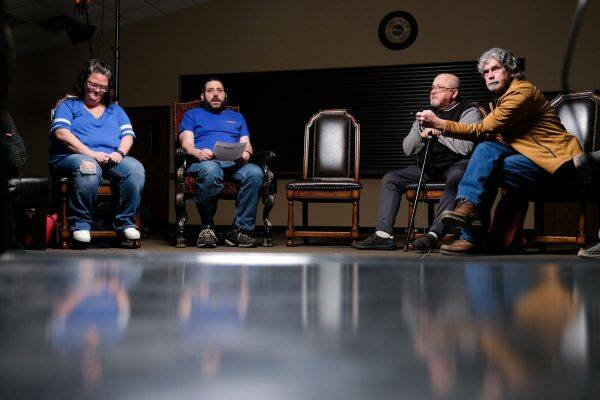
By 2016, his health concerns “progressed to the point of having nerves burned in my back because the pain was so unrelenting,” said Heflin, the Woodward church’s preacher.
Now diagnosed with ankylosing spondylitis — the same ailment as Brien — and Crohn’s disease, the minister said he feels pain almost all the time.
That’s especially true if he stops to think about it.
“There have been times when I typed my sermon on my knees because I couldn’t sit,” he said.
The 47-year-old father of three started Broken & Mended in 2018 to help himself and others.
“I just felt when I was at my worst that I didn’t really have anyone that I could turn to,” he said. “I tried to find a support group for Christians with chronic illness and could not find one. And so I began creating our own.”
Extending far beyond northwestern Oklahoma, the nonprofit has inspired additional Broken & Mended groups to form both online and in person — including meetings in Florida and at least eight Churches of Christ in Kenya.
Via video-conferencing technology, Timothy Gunnells — who endured years of excruciating pain from severe psoriatic arthritis — keeps up with the Woodward meeting from his home in Tennessee.
Stem cell therapy in Mexico last fall has helped reduce the level of the longtime preacher’s pain. He’s feeling so much better that he’s returning to full-time ministry next month with the Southside Church of Christ in Shelbyville, Tenn.
He became aware of Broken & Mended when he connected with Heflin online.
“I can’t really fully describe this for somebody who doesn’t really understand,” Gunnells said of the support group, “but I had felt isolated for so long. And even at church, people didn’t quite understand what I was going through. And they weren’t sure how to talk to me.”
Broken & Mended provided a desperately needed lifeline.
“Just sharing my own issues with my health and listening to other people share in that first meeting,” he said, “it lifted a burden off of me that I didn’t even know I had.”
Not alone
Inside the circle, other stories of triumph abound.
Some days Austin — the teacher — feels like sitting on the floor and reading a book to her kindergarten students. Other days she must stand.
“It just depends,” she said. “Sometimes during playtime, I can play, and sometimes I’m like, ‘OK, now I have to grade papers.’ I just make it work one day at a time.”
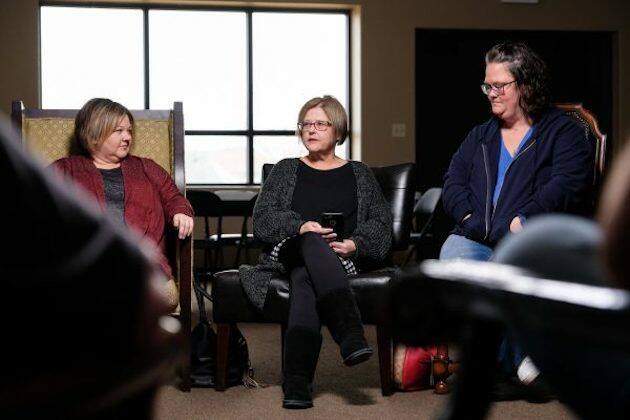
At Broken & Mended, fellow Christians relate to her limitations — but also to the unexpected blessings chronic pain can bring.
“These limitations have helped us to see Jesus’ love in different ways,” she said. “I can look at people and say, ‘That person is hurting; how can I help them? That person can’t do this right now; what could I do for them?’”
When Valentine — the school secretary — first began attending the meetings, she couldn’t talk without crying.
But now she looks forward to sharing her burdens and prayer needs with the circle.
Broken & Mended helps Valentine realize that other people “have it so much worse than I do.”
“We have people who are on oxygen. We have people who can’t physically come to the meetings,” she said. “But at the same time, they still have the strength to keep relying on God. That helps a lot that they don’t feel sorry for themselves. There’s strength in that.”
Brien pastors the nondenominational Richmond Country Church in a wheat field about 30 miles southeast of Woodward. He also serves as a foster parent for sets of siblings.
He first connected with Heflin when he brought his foster children to a parents’ night out event organized by the Woodward church.
“I was actually on a cane at that time because I was just really wobbly,” Brien recalled. “I introduced myself to David, and I told him about my condition. And he kind of smirked and said, ‘I’ve got the exact same thing.”
Heflin invited Brien to share his experience at Broken & Mended, and a bond was formed.
“It’s been a blessing just to get to hear other people’s stories,” Brien said. “One of the enemy’s tactics is to try and isolate you, and he’s very good at that. You get to feeling like you’re the only one or nobody understands. But when you hear other people … you know you’re not alone.”
Beauty from brokenness
As Heflin sees it, the Lord cared about hurting people — and Christians should, too.
In 2 Corinthians 12, the apostle Paul references a thorn in his flesh and quotes Jesus, who said, “My grace is sufficient for you, for my power is made perfect in weakness.”
That passage reminds the Oklahoma minister that the church misses out when it lets people with chronic pain fall through the cracks.
“We can see God’s power at work in a special way through that illness, through that weakness,” Heflin said. “We believe that God is at work to make something beautiful out of our brokenness.”
– BOBBY ROSS JR. is Editor-in-Chief of The Christian Chronicle, where this article was originally published. Used with permission. Photos by Audrey Jackson.







